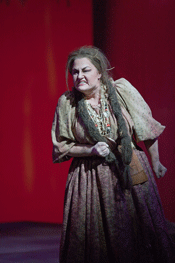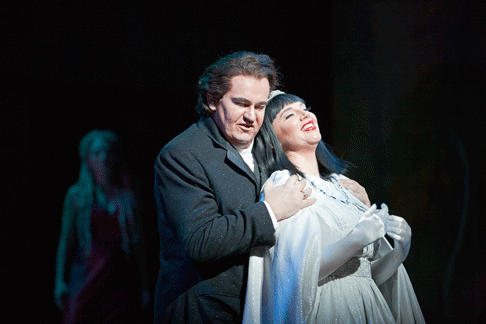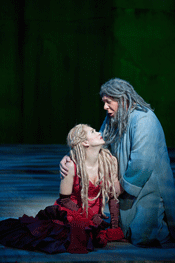17 Feb 2011
Opera Colorado’s ‘mermaid’ tremendous
The story is ages old, and every culture has a version of it: the mythic princess of an underwater realm longs for the love of a mortal man.

The story is ages old, and every culture has a version of it: the mythic princess of an underwater realm longs for the love of a mortal man.
Yet, despite the enchantment of the hyper-romantic staging and the mesmerizing quality of the singing, there was something discomfortingly contemporary about Rusalka in the Opera Colorado production of the Dvořák classic that opened at the Ellie here on Saturday. And it wasn`t only the carefully thought-out direction of Eric Simonson and Bill Murray, with the staging since it was new in Boston, that made it that. It was rather that timeless something in a great work of art that picks up on what`s happening in the present world and comments on it. Humans, Rusalka makes clear, are not all they`re cracked up to be; they`re selfish, self-centered, fickle and at times mean little animals who do each other no good.
 Catherine Cook as Jezibaba
Catherine Cook as Jezibaba
Okay, okay; even when played to perfection by Kelly Kaduce, as the role was
on Saturday, Rusalka contributes markedly to her own undoing. She`s made mute
by the witch`s potion that allows her to emerge from her watery realm to marry
her Prince, and — more fish than Frau — she brings with her the
coldness of the depths. (A shrink would immediately shout “frigid!”
) Nonetheless, the statement by Rusalka`s father to his disillusioned daughter
“Humans are scum” hit an open nerve Saturday as an acute
observation on the mess they have made of the present world.
Like Kaduce, principals in the cast — all amazingly fluent in Czech! — sing superbly. With his resonant bass Stefan Szkafarowsky made father Vodnik an unusually sympathetic figure. And although Catherine Cook, long a powerful presence at San Francisco Opera, got a little too much Marjorie Main into her act, she portrays witch Jezibaba as figure to be feared.
The immensely popular Met movies have put new emphasis on the visual side of opera. The result, someone observed, is that a wig now can be more important than a voice. It follows that although he has a winning instrument, as the lover Prince Avgust Amonov is simply no match for the awesome beauty of this staging. He is a leaden actor, who further prompts one to ask how any woman can love a tenor whose tummy pops a button on his tunic in Act One.
 Avgust Amonov as The Prince and Dana Beth Miller as The Foreign Princess
Avgust Amonov as The Prince and Dana Beth Miller as The Foreign Princess
Dana Beth Miller — a mezzo of auburn radiance — slightly overdoes the vulgarity of the Foreign Princess who vamps the Prince — and one wishes OC had been able to find that white dress in her size.
Wood Sprites Nicolle Foland, Anna Noggle and Megan Marino would be the pride of any production of Wagner’s Rheingold.
John Baril prepared the chorus that sings largely off stage.
Wendell K. Harrrington handles the transitions from the world of water to that of mortals with projections fully in harmony with Dvořák`s score, and University of Colorado graduate Rachael Harding elevates the enchantment of the staging with her choreography for the ten talented dancers involved.
 Kelly Kaduce as Rusalka and Stefan Szkafarowsky as Vodnik
Kelly Kaduce as Rusalka and Stefan Szkafarowsky as Vodnik
While Erhard Rom designed winning sets for the outer acts, the
pseudo-Bauhaus simplicity of Act Two is banal by comparison.
Rusalka, premiered in 1900, is a Romantic opera of the first order, and there is not one weak measure in the three hours that it takes to perform it. Russian conductor Alexander Polianichko is totally at home in Dvořák`s well-wrought score and extracts both heavily dramatic and delicately sensitive playing from the Colorado Symphony.
Courtney Hershey Bress plays Hell out of that harp!
Even in the midst of so much excellence, however, it is Kelly Kaduce who makes this production the triumph that it is. The truly lovely small-town Minnesota woman is no longer a singer on the rise. She’s there! Small wonder that when she appeared for her curtain call on Saturday someone in the comfortably packed Elli joyfully called out in joyous spontaneity: “Move over, Renée!”
Wes Blomster